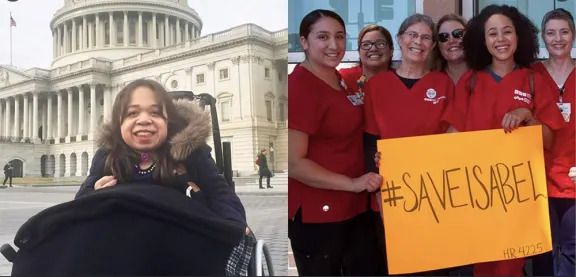
UCSF Patient, Advocates Speak Out Against Immigrant Patient Deportation Before Congress
UCSF immigrant patients, advocates, and health providers travelled to Capitol Hill on Sept. 11 to join others who were speaking out against the revocation of medical deferred action for gravely ill immigrants. During a hearing on Medical Deferred Action held by the House Committee on Oversight and Reform, the speakers urged lawmakers to protect immigrant patients who have historically been allowed to stay past the terms of their visas to receive life saving care.
“The medical care I need is not available in Guatemala,” UCSF patient Maria Isabel Bueso told the bipartisan panel of lawmakers. “If I’m sent back, I will die.”
For patients living with Maroteaux-Lamy Syndrome, the complications associated with the life-threatening genetic disorder provide more than enough to worry about. For Bueso, these anxieties have taken on a new gravity.
Bueso has received lifesaving treatment for her rare condition at the UCSF Benioff Children’s Hospital in Oakland for the past 16 years.
In recognition of her severe illness and the lack of treatment options in her native Guatemala, she has been residing legally in the United States under the US Customs and Immigration Services (USCIS) medical deferred action program.
During the course of her stay, Bueso has participated in eight clinical trials, giving valuable insight and hope to many who share her condition and opening countless doors for her own future.
That all changed following a quiet reversal in the Trump Administration policy on medical deferred action. In early August, without public announcement, immigrants granted or awaiting deferred action based on medical need were given 33 days to leave the country with no opportunity for appeal.
“There had been no prior notice, no opportunity to advocate for the program,” immigrant legal services director Anthony Marino told the House Committee.
USCIS released no official statement regarding the program’s cancellation and a representative could not be reached for comment. However numerous media outlets reported that USCIS representatives cited a high case load as justification, stating that termination of these deferred action requests would free their employees to address other immigration cases.
For many, this justification fell flat.
“It is outrageous to deport a young person with a serious illness that can only be treated in the U.S.,” Bueso’s immigration attorney Martin Lawler stated in the change.org petition advocating for extending the medical deferred status program.
Patients, advocates, and politicians shared in that outrage, some arguing that these abrupt and summary denials were the latest chapter in the Trump Administration’s continuing effort to vilify and torment even the most vulnerable members of the immigrant community.
On Twitter, the hashtag #SaveIsabel was gaining traction among the UCSF community and beyond, including among lawmakers like House Committee member Rep. Mark DeSaulnier (D-Calif.) and Assemblymember Rob Bonta (D-Alameda).
In a statement, UCSF Chancellor Sam Hagwood characterized the policy change as “contrary to the most fundamental notions of basic human rights.”
Demonstrators nationwide spoke out against the administration’s stance, with the California Nurses Association spearheading a protest on September 6th at the Oakland UCSF facility where Bueso has long received her care.
Over 100 Democratic lawmakers signed a letter assailing the mass denials of deferred action as “unfair to families who followed longstanding USCIS procedures” and reflective of a “growing disregard for accountability and transparency.”
Signatories included California Rep. Zoe Lofgren (D-San Jose), DeSaulnier and presidential hopefuls Elizabeth Warren, Amy Klobuchar, and Bernie Sanders.
Before the hearing, and in the face of such extensive criticism, USCIS walked back its summary dismissal of deferred action applications.
On Sept. 2, the federal immigration department announced it would re-open for review cases that were pending as of Aug. 7. In its issued statement USCIS provides no reason for its reversal, only re-asserting that upon completion “career employees who decide such [deferred action] cases will be more available” to efficiently address other kinds of applications.
While this was viewed as a victory by many of the administration’s opponents, the concerns remain for patients like Bueso.
Having long navigated the uncertainty of her disease, she must now navigate the fog of an uncertain future regarding her immigration status and its inseparable effect on her well-being.
Future deferral requests will likely be managed by Immigrations and Customs Enforcement (ICE), which carries myriad complications of its own.
Deferral requests can only be made through ICE once a deportation notice has already been issued, meaning future immigrant patients requiring lifesaving care past the terms of their visas must first be scheduled for deportation.
“You shouldn’t force people to become illegal to get medical treatment,” Lawler told Synapse.
Given that ICE is the enforcement arm of immigration law, many doubt the capacity of the organization to efficiently handle such a sensitive issue.
“ICE officials [stated] that they have no program in place and no plans to implement one,” Marino stated in his testimony to the House Committee.
With little direction and no guarantees, patients and advocates are left only with worry.
“This is not a partisan issue,” Bueso told lawmakers. “This is a humanitarian issue. And our lives depend on it.”



